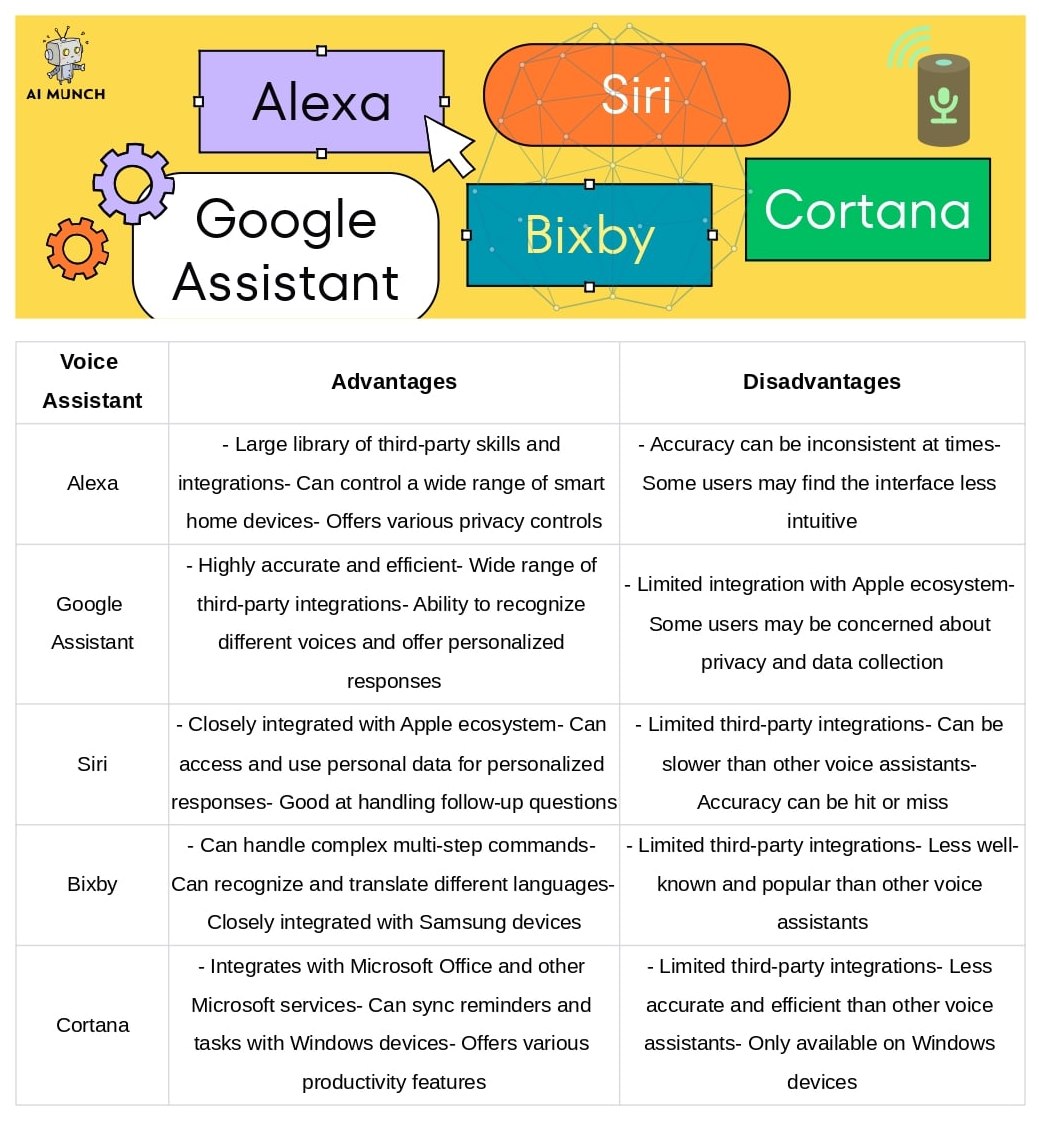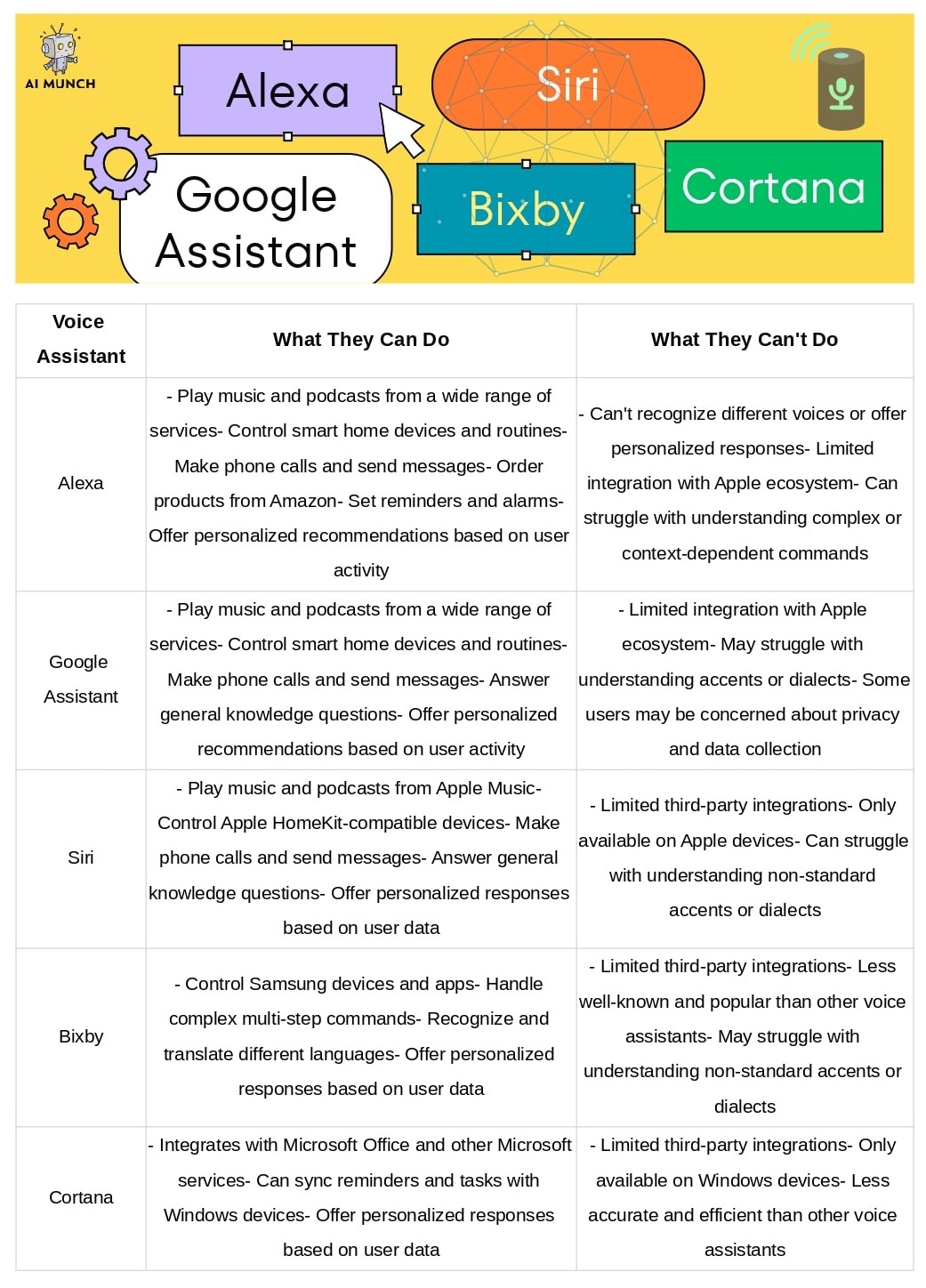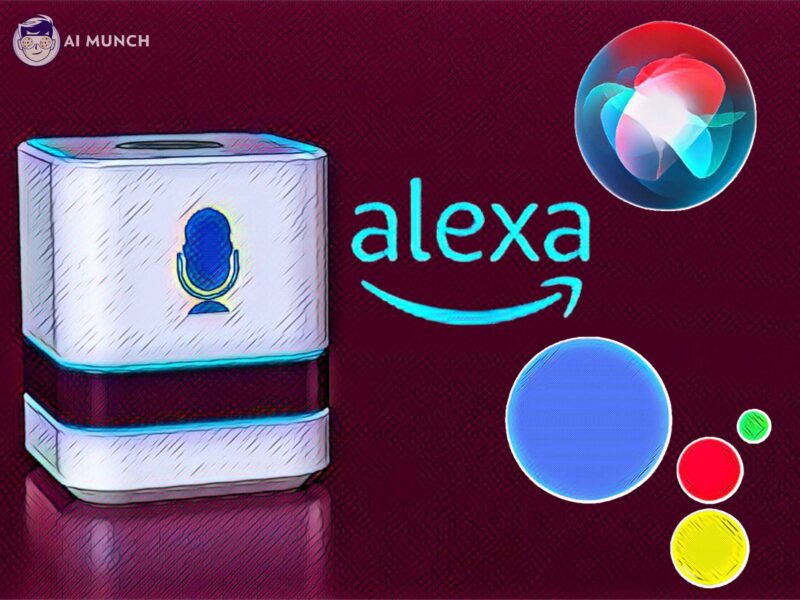I. Introduction
Voice assistants: Alexa, Siri, and Google Assistant
As this technology is used in more and more businesses, artificial intelligence is taking over the world. After the launch of OpenAI ChatGPT this hype increased. These days, millions of people rely on AI voice assistants for everything from controlling their smart home devices to setting reminders and playing music. The world wants to know the answer to “Amazon Alexa vs Apple Siri vs Google Assistant.” For example, which one is best for them? Alexa from Amazon, Siri from Apple, and Google Assistant from Google are the top three most used voice assistants. When released in 2014, Amazon’s Alexa quickly became one of the most popular voice assistants available. It’s the brains behind the Echo smart speakers sold by Amazon and is used by over 100 million people monthly. Since 2011, Siri, Apple’s built-in voice assistant, has been available on the iPhone, iPad, and HomePod. Google Assistant is a voice-activated system that was released in 2016. It can be found on Android devices and Google’s new home products.
Why compare Alexa, Siri, and Google Assistant
Voice assistants are part of emotional AI. Finding the best voice assistant for your needs can be hard among the many available. A comparison of the three most widely used voice assistants can be instructive. By comparing features, accuracy, performance, privacy, and security, integration with other services, and more, we can help users choose the best voice assistant for their needs.
Chatbots are part of voice assistants, and as different chatbots have different features, so do these three technologies. This article will compare Google Assistant, Amazon Alexa, Siri Voice Assistant, and Google Assistant in several ways. We’ll compare and contrast the features that each assistant offers, their ability to understand and respond to voice commands, their overall performance, and their ability to work with other services. Privacy and security concerns and other problems with how these assistants work will be investigated. At the end of this article, readers should be able to compare and contrast the features of different voice assistants and choose the best one for their needs.
II. Alexa vs Siri vs Google Assistant: Features
A. Comparison of Voice Assistants
All three principal voice assistants—Alexa, Siri, and Google Assistant—provide various useful functions. Alexa can do a lot of different things, like play music, set reminders, answer questions, control smart home devices, and even make phone calls. Amazon Alexa Skills is another way users can add more features to their Echo devices by installing apps from third-party developers.
Many of Alexa’s capabilities, such as calling, texting, and setting reminders, are also available on Siri. The user’s calendar, contacts, and email are just some of the Apple ecosystem data it can access. Siri also has a feature called Shortcuts that lets users automatically make their own voice commands to carry out repetitive tasks.
Playing music, creating reminders, and managing smart home devices are just a few of the many functions that Google Assistant can do. It can also tell the difference between different voices, which lets it respond differently to each person. Continued Conversation is a feature of Google Assistant that lets users have a more natural conversation with the assistant without saying “Hey Google” before each command.
Alexa is compatible with the most intelligent home devices, Siri is optimized for Apple products, and Google Assistant was built from the ground up for Android. But all three voice assistants work with more hardware than smartphones, smart displays, and smart speakers.
B. Which voice assistant has most innovative Features
All three voice assistants are well-liked because of the helpful and novel features they offer. In contrast, Google Assistant stands out for its natural language processing and ability to handle complex questions. Duplex is one of its features; it lets you schedule appointments and make reservations at nearby restaurants by simply talking to the app.
On the other hand, Siri is particularly well-suited to Apple’s ecosystem, which it supports. It is a great choice for regular Apple product users because it can access and control the user’s calendar, contacts, and other apps.
Amazon Alexa voice assistant has many third-party skills that users can install on their Echo devices to give them new capabilities. You can learn anything, from how to play a game to knowing the weather forecast.
For the most part, it’s up to the individual user’s preferences and needs to determine which voice assistant offers the most useful or innovative features.
III. Alexa vs Siri vs Google Assistant: Accuracy
A. Comparing understanding and responses to voice commands
When it comes to voice assistants, precision is vital. All three voice assistants are about the same in how well they understand and act on voice commands. There are, however, distinctions between the two.
Loup Ventures found that Google Assistant answered questions correctly 92.9% of the time, making it the most accurate voice assistant. Apple’s Siri finished in second place, with an accuracy rate of 83.1% compared to Alexa’s 79.8%.
B. Where one voice assistant excels in accuracy over the others
Google Assistant is excellent at both understanding natural language and answering complicated questions. It can also remember the context of questions it has already responded to, which helps it give better answers.
On the other hand, Siri is known for how well it understands voice commands and responds to each user. It uses the user’s data and Apple’s ecosystem to provide more precise answers.
Even though all three voice assistants are generally reliable, Google Assistant may work better for people who ask complicated questions and use natural language. On the other hand, Siri may be better for people who like Apple products and prefer personalized answers.

IV. Alexa vs Siri vs Google Assistant: Performance
A. Compare the overall performance of each voice assistant
Speed, reliability, and ease of use
Performance-wise, all three voice assistants are commendable. On the other hand, their rates of reaction and speed vary.
Bespoken found that Google Assistant had the quickest response time of any voice assistant, clocking in at an average of 0.95 seconds and averaging 1.14 seconds slower than Alexa was runner-up Siri.
All three voice assistants have become significantly more trustworthy over time. Users have complained, though, that it is slow and not always accurate, especially in noisy places or when more than one person is talking at the same time.
B. Where one voice assistant outperforms or struggles
Compared to its competitors, Google Assistant stands head and shoulders above the rest, thanks to its lightning-fast response time. It can also understand spoken words and give more precise answers.
On the other hand, Siri is great because it works well with Apple’s ecosystem and can access and use user data to give relevant answers. On the other hand, it might need help picking up on accents and specific phrases.
Although Amazon Alexa voice assistant has a lot of third-party skills, it may need help understanding complex questions and giving correct answers.
In the end, the best voice assistant is the one that best fits the user’s requirements and preferences.
V. Privacy and Security
A. Compare each voice assistant’s privacy and security features
How they handle user data and whether they offer any privacy controls
When using a voice assistant, it is crucial to consider privacy and security. There are privacy policies for each of the three voice assistants that explain how they collect and store user data.
You can see and delete your voice and search history in Google Assistant and manage how your data is used for personalized ads. Even though Siri lets users manage their information and clear their browsing history, it may be keeping track of more news than they realize.
The “Alexa Privacy” feature lets users listen to their voice recordings, delete them, and control what information they share with third-party apps.
B. Concerns or controversies of these voice assistants
There has been a lot of talk and worry about how private and safe these voice assistants are. In 2019, Amazon had contractors listen to recordings made by Amazon Alexa voice assistant users without their knowledge or permission. This prompted more people to question Amazon’s privacy practices, which started the company to roll out more privacy settings.
A report from the year 2020 says that users’ conversations with Google Assistant were secretly recorded and saved without their permission. As a result, more people started worrying about how tech companies use the data they collect from their customers.
Overall, users should consider what a voice assistant means for their privacy and security and look into the privacy settings and available tools.
VI. Integration with Other Services
A. Integrates with third-party apps
Such as music streaming, smart home devices
All three voice assistants work with a wide range of third-party products, from music streaming services like Spotify to smart home devices like Philips Hue and Nest. However, they vary in how smoothly they work with other platforms’ software and services.
Google Assistant works with more third-party devices and services than Siri and Alexa. On the other hand, Alexa has an extensive library of third-party skills that can be turned on for a wide range of services. Siri is also tightly connected to Apple’s ecosystem, which includes Apple Music and HomeKit devices.
B. Discuss limitations or compatibility issues
Voice assistants can be helpful, but they only sometimes work with older or less popular devices, which can be annoying. For instance, not all smart home gadgets will work with all three voice assistants, or they may only work with restricted features.
Lack of support for specific languages or accents is another potential problem for users. All three voice assistants have improved at this, but they may still need help with regional variations in accents or languages.

VII. Conclusion
A. Summary
In conclusion, each of the three voice assistants has advantages and disadvantages; the best option will ultimately rest with the individual user. If you care most about speed and accuracy and want a wide variety of integrations with other services, Google Assistant is your best bet. Siri is a great choice for Apple fans who want a voice assistant that can access and use their personal information to give answers that make sense in the current situation. Users who care about privacy and want access to third-party skills and integrations will find Amazon Alexa voice assistant a good fit.
B. Future developments in the voice assistant market
Voice-enabled devices and services are becoming more common, which is good news for the voice assistant business. Voice interfaces are getting more natural and conversational, and voice assistants are being used more and more in places like healthcare, wellness, and the home.
Users should consider their preferences and requirements when deciding on a voice assistant. You should also familiarise yourself with the privacy settings and options provided by each platform and make it a habit to check for updates.
FAQs
Voice assistants can be compatible with various devices, including smartphones, smart speakers, smart displays, and home appliances.
The accuracy of voice assistants can vary depending on factors such as background noise, accents, and the complexity of the command. However, most modern voice assistants have high accuracy rates.
Amazon Alexa voice assistant, Apple’s Siri, and Google Assistant are just a few of the most popular voice assistants, and they all come equipped with privacy and security features. But you should be aware of the risks and take steps to protect your data and equipment.
Yes, voice assistants can integrate with various other services and devices, such as music streaming services, smart home devices, and third-party apps.
The “best” voice assistant is the one that fits your specific needs and preferences. Users should consider factors like device compatibility, features, and privacy when deciding between Alexa, Siri, and Google Assistant.











2 comments